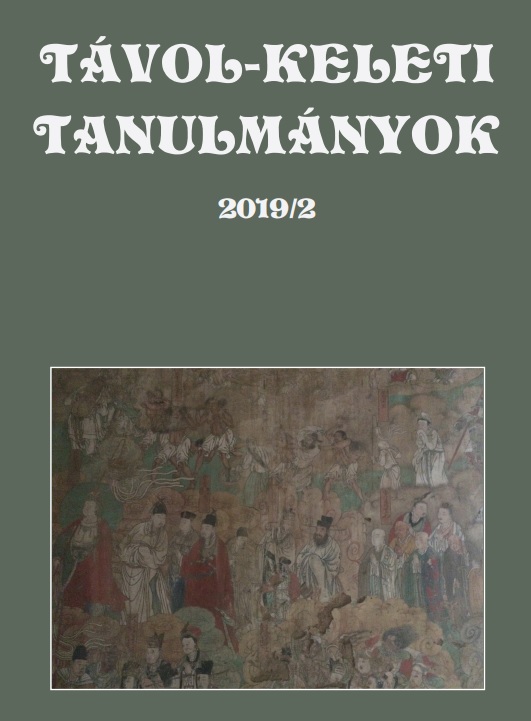Megjelent 2020-10-30
Kulcsszavak
- Konfuciusz Intézet,
- puha hatalom,
- Hanban,
- média
Hogyan kell idézni
Copyright (c) 2020 a szerző(k)

This work is licensed under a Creative Commons Attribution-NonCommercial 4.0 International License.
Absztrakt
This paper introduces and examines Confucius Institutes (CI) as part of China’s soft power – with a special focus on the problems regarding the CI’s in Hungary. I also intend to analyse what kind of picture of the CI’s the media presents and how realistic this image is. I will discuss in two separate chapters the most serious accusations made against the CI’s (spreading Chinese propaganda, violation of human rights and academic freedom and spying for China) because I consider that these topics provide valuable insights into the considerable influence exercised by the media even in the case of assessing educational and cultural institutions. The term “soft power” was introduced by Joseph Nye in 1990, referring to the ability to make the image of one’s country desirable abroad by using culture, ideology or institutions. But China had already discovered in the 80s how important culture and language can be as means to obtain power without recourse to “hard” methods. In 1987 China established Hanban; the first experimental CI was set up in 2004 in Uzbekistan and the first official CI was founded in South Korea in the same year. As of April, 2020 there are 540 CI’s world-wide, according to Hanban’s website, which clearly indicates that the CI’s are hugely successful. In Hungary there are currently 5 CI’s.
Hivatkozások
- „About Confucius Institute/Classroom.” A Hanban honlapja. http://english.hanban.org/node_10971.htm (utolsó letöltés: 2020.01.11.)
- Adamson, Bob – Wang Danping 2015. „War and Peace: Perceptions of Confucius Institutes in China and USA.” The Asia-Pacific Education Researcher 24/1: 225–234. https://doi.org/10.1007/s40299-014-0174-5
- Alliance Française Magyarország honlapja. http://af.org.hu/?lang=hu (utolsó letöltés: 2020.01.11.)
- „Background”. A Chiang Ching-kuo Alapítvány honlapja. http://www.cckf.org/
- en/about/background (utolsó letöltés: 2020.01.12.)
- British Council Magyarország honlapja. https://www.britishcouncil.hu (utolsó letöltés: 2020.01.11.)
- „A Cervantes Intézet bemutatása.” A Budapesti Cervantes Intézet honlapja. https://budapest.cervantes.es/hu/magunkrol_spanyol.htm (utolsó letöltés: 2020.01.11.)
- „Constitution and By-Laws of the Confucius Institutes.” A Hanban honlapja. http://english.hanban.org/node_7880.htm (utolsó letöltés: 2020.01.11.)
- „Direcciones de contacto.” Az Instituto Cervantes honlapja. https://www.cervantes.es/
- sobre_instituto_cervantes/direcciones_contacto/sedes_mundo.htm (utolsó letöltés: 2020.01.11.)
- „Guide for Confucius Institute Deans.” A Hanban honlapja. http://english.hanban.org/
- node_7877.htm (utolsó letöltés: 2020.01.11.)
- Gunia, Amy 2019. „A Senate Report Has Slammed the Chinese Learning Centers Operating at Over 100 U.S. Universities.” Time, február 28. URL: https://time.com/
- /senate-report-confucius-institute-us-universities-chinese/ (utolsó letöltés: 2020.01.12.)
- A Hanban honlapja. http://english.hanban.org (utolsó letöltés: 2020.01.11.)
- „History of the Goethe-Institute.” A Goethe Intézet honlapja. https://www.goethe.de/en/uun/org/ges.html (utolsó letöltés: 2020.01.12.)
- „Iran jails two, including UK dual national, for spying for Israel.” 2019. Aljazeera, augusztus 27. https://www.aljazeera.com/news/2019/08/iran-court-upholds-british-council-employee-10-year-jail-term-190827082404755.html (utolsó letöltés: 2020.01.12.)
- „Iran bans cooperation with British Council, warns of prosecution.” 2019. Reuters, november 5. https://www.reuters.com/article/us-iran-britain-council/iran-bans-cooperation-with-british-council-warns-of-prosecution-idUSKBN1XF1RF (utolsó letöltés: 2020.01.12.)
- A Kelet- és Közép-európai Tanárképző Központ honlapja. http://confucius-institutes.eu, (utolsó letöltés: 2020.01.11.)
- Lahtinen, Anja 2015. „China’s Soft Power: Challenges of Confucianism and Confucius Institutes.” Journal of Comparative Asian Development 14/2: 200–226. https://doi.org/10.1080/15339114.2015.1059055
- “Leiden University to end agreement with Confucius Institute.” 2019. A Leideni Egyetem honlapja, február 19. URL: https://www.universiteitleiden.nl/
- en/news/2019/02/confusius-instituut-en (utolsó letöltés: 2020.01.11.)
- Li Shuai – Tucker, Richard 2013. „A Survey of the Confucius Institues: Opportunities and Challenges in Promoting Chinese Language and Culture Education.” Journal of the Chinese Language Teachers Association 48/1: 29–53.
- „Locations.” A Goethe Intézet honlapja. https://www.goethe.de/en/wwt.html (utolsó letöltés: 2020.01.11.)
- „Magyar nyelvű kínai tankönyveink.” Az ELTE Konfuciusz Intézet honlapja. http://www.konfuciuszintezet.hu/index.php?menu=oktatas&almenu=tankonyvek (utolsó letöltés: 2020.04.11.)
- „Megjelent a Kínai-Magyar Nagyszótár!” 2019. Az ELTE Konfuciusz Intézet honlapja, október 16. http://www.konfuciuszintezet.hu/index.php?menu=hirek&almenu=107 (utolsó letöltés: 2020.01.11.)
- „Nemzetbiztonsági fenyegetésnek minősítették a brüsszeli Konfuciusz Intézet igazgatóját.” 2019. Index.hu, október 30. https://index.hu/kulfold/2019/10/30/
- konfuciusz_intezet_brusszel_kitiltas_kemkedes/ (utolsó letöltés: 2020.01.11.)
- Nye, Joseph S. Jr. 1990. Bound to lead: The changing nature of American power, New York: Basic Books.
- Nye, Joseph S. Jr. 2004. Soft Power: The means to success in world politics, New York: PublicAffairs.
- Rogin, Josh 2018. „Pentagon barred from funding Confucius Institutes on American campuses.” The Washington Post online, augusztus 14. https://www.washingtonpost.com/news/josh-rogin/wp/2018/08/14/pentagon-barred-from-funding-confucius-institutes-on-american-campuses/ (utolsó letöltés: 2020.01.12.)
- Salát Gergely 2010. „Kína puha ereje.” Kommentár 6: 100–113.
- Selmier, Travis W. 2016. „Why the English speaking world needs Confucius Institutes.” International Communication of Chinese Culture 3/2: 261–274. https://doi.org/10.1007/s40636-015-0045-7

